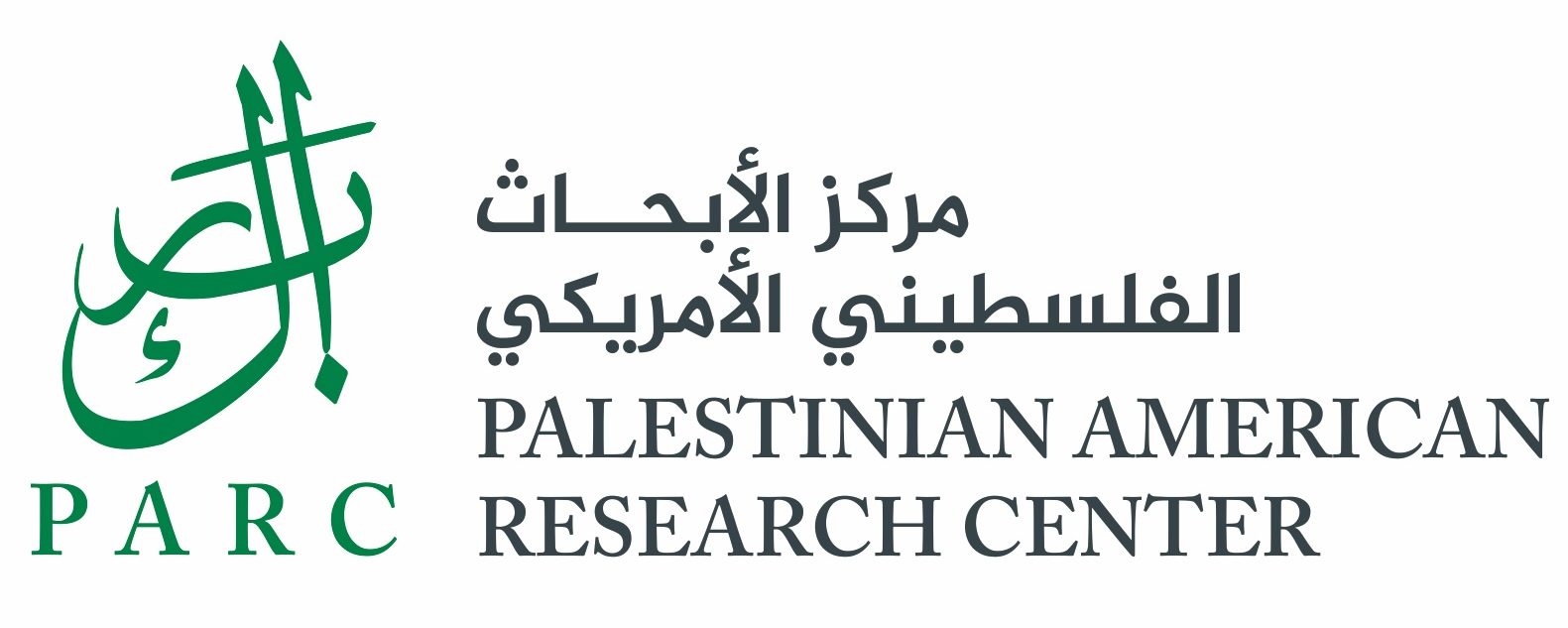PARC Panels at MESA
Shrinking Spaces, Excluded Communities, and Transformed Environments: Exploring Health and Environment Among Palestinians through Eco-Social Approaches
Organizer: Weeam Hammoudeh,* Birzeit University
- Weeam Hammoudeh,* Birzeit University – Environment and Health in the Northwest Jerusalem Enclave
- Brian Boyd,* Columbia University and Omar Tesdell,* Birzeit University – People, plants and landscapes: future ecologies in Palestine
- Maysaa Nemer, Birzeit University – Social and political determinants of health of Palestinian Agriculture Working Women in the Jordan Valley
- Usama Tanous, Emory University – The Health of Palestinians in Israel from a Settler Colonial Perspective
Reciprocal Mobilization in the Politics of BDS: Strategy, Competition, and Wars of Position
Organizer: Nathan Shils, University of Pennsylvania
Chair: Noura Erakat,* Rutgers University
Discussant: Maha Nassar, University of Arizona
- Nathan Shils and Ian Lustick, University of Pennsylvania – Israeli Responses to BDS: A War of Maneuver to Avoid a War of Position
- Taib Biygautane Hebrew University and Maia Hallward Carter,* Kennesaw State University – The Politics of Anti-Normalization among Moroccan Leftist, Islamist, and BDS Activists
- Sophia Hoffinger, University of Edinburgh – Judge as German: The Politics of Judgement in the Palestinian Boycott, Divestment, and Sanctions (BDS) Efforts in Germany
Unchilding in the Middle East and North Africa, Part 1
Co-sponsored with Association of Middle East Children and Youth Studies (AMECYS)
Organizer and Chair: Heidi Morrison,* University of Wisconsin, La Crosse
Discussant: Lara Sheehi, George Washington University
- Julie Shatz, California State University, Fresno – Childing and Unchilding Juvenile Offenders in Mandate Palestine
- Bella Kovner, Hebrew University – Unaccompanied asylum-seeking youth in Greece: Protection, liberation and securitization
- Leyla Neyzi, University of Glasgow – “Unchilding” and Agency: Memories of War and Displacement among Kurdish Youth
- Abeer Otman, Hebrew University – Interrupting Unfathering: Palestinian Fathers Challenging Unchilding
Unchilding in the Middle East and North Africa, Part 2
Co-sponsored with Association of Middle East Children and Youth Studies (AMECYS)
Organizer and Chair: Heidi Morrison,* University of Wisconsin, La Crosse
Discussant: Nadera Shalhoub-Kevorkian, Hebrew University
- Nazan Maksudyan, Freie Universität Berlin – Armenian Children who Survived the Genocide
- Chiara Diana, Université Libre de Bruxelles – Practicing Political Agency and Activism against Unchilding in Tunisia
- Rami Salameh,* Birzeit University – The Dialectics of Oppression: Resisting the Negation of Childhood through Violence
- Cindy Sousa, Bryn Mawr College – “They don’t see anything but this kind of treatment:” Mothers Speak about the Loss and Reclamation of Palestinian Childhood with Settler Colonialism
Strategizing from Below: New Palestinian Social Histories of the Twentieth Century
Organizer: Alex Winder,* Brown University
Discussant: Sherene Seikaly,* University of California, Santa Barbara
- Sreemati Mitter, Brown University – The pensioners fight the banks: Financial aspects of the transition from Ottoman to British Mandate rule
- Charles Anderson, Western Washington University – Society in Revolt: Civil Resistance and Rebel Organization in the Great Revolt (1936-39)
- Alex Winder,* Brown University – Extralegal Justice within Palestinian Uprisings: The 1936–39 Revolt and the First Intifada
- Haneen Naamneh,* London School of Economics – Arab Jerusalem and the Struggle for Centrality after the Nakba
New Directions in Mental Health in Palestine
Co-sponsored with Association of Middle East Children and Youth Studies (AMECYS)
Organizer: Heidi Morrison,* University of Wisconsin, La Crosse
Chair: Rachel Stryker,* California State University, East Bay
Discussant: Stephen Sheehi,* College of William and Mary
- Heidi Morrison,* University of Wisconsin, La Crosse – Beyond Symptomology: How portraiture can enrich our understanding of childhood trauma in Palestine
- Said Shehadeh, Independent Scholar, Ramallah/NY – On Community Resilience and Palestinian Selfhood: Notes from Clinical Practice in West Bank, Palestine
- Rachael Stryker,* California State University, East Bay – Emotional Suspicion and Emerging Pediatric Psychologies in Palestine’s West Bank
- Layaly Hamayel, Palestinian Counseling Center – Who Seeks Counseling/Therapy in Palestine: The Ten-year Pattern of Adult Mental Health Service Utilization Behavior in a Non-profit Centre in the West Bank
Doing Palestine While Palestinian: Overcoming the Fragmentation of Our Intellectual Diaspora (Roundtable)
Organizer: Nadim Bawalsa,* Independent Scholar
Chair: Salim Tamari,* Institute for Palestine Studies
- Nadim Bawalsa,* Independent Scholar
- Amal Eqeiq,* Williams College
- Manal A. Jamal,* James Madison University
- Samer Al-Saber, Stanford University
- Refqa Abu-Remaileh, Freie Universität Berlin
Organizing Faculty-Led, Student Trips to Palestine: A Conversation on Opportunities, Obstacles and Best Practices (Discussion & Info Session)
Imprisoning a Generation (Film)
Co-sponsored with Association of Middle East Children and Youth Studies (AMECYS)
Resisting Enclosure: Movement Restrictions, the Built Environment, and Immobility in Palestine
Organizer: Joshua Stacher*
Chair: Michael Hudson,* Georgetown University
Discussant: Omar Jabary Salamanca, Ghent University
- Maryam Griffin,* University of Washington, Bothell – The Bus as Vehicle of Resistance in Palestinian Protest Actions
- Julie Peteet,* University of Louisville – Mobilities, Indigeneity and Resistance in Palestine
- Joshua Stacher,* Kent State University – A Race against the Wall: Origins and Development of the Palestine Marathon
- Gary Fields,* University of California, San Diego – Gaza: An Enclosed and Immobilized Landscape
Culture and Revolution in Beirut: Counter-Narratives in Politics, Literature, and Art
Organizers: Adey Almohsen,* Reema Salha Fadda and Nate George
Chair: Elizabeth Holt, Bard College
- Adey Almohsen,* University of Minnesota – Critiquing Exile/Theorizing Nation: An Account of Post-1948 Palestinian Literary Criticism
- Nate George, Rice University – “Our 1789”: Kamal Jumblatt, the Lebanese National Movement, and the Abolition of Sectarianism in Lebanon, 1975-1977
- Reema Salha Fadda, University of Oxford – Competing Visions for a Transnational Museum? Negotiating the Political Economy of Palestinian Cultural Production in a Neoliberal Age
Hebron in the Modern Period: Social, Political, and Economic Dynamics in Southern Palestine
Created and organized by Alex Winder,* Brown University
Chair/Discussant: Issam Nassar, Illinois State University
- Susynne McElrone,* Independent Scholar – Rethinking the paradigm of Ottoman land-tenure reforms in Palestine in light of new evidence
- Alex Winder,* Brown University – Family, social, and professional networks in Mount Hebron before and after 1948
- Kimberly Katz,* Towson University – The law and society: Hebron under Jordanian rule, 1951-1953
- Belal Shobaki, Hebron University – Hebron in the Israeli-Palestinian Confict: Settlement without Peace
Success as Subjugation: Palestinian Education under Settler Colonialism
Created by Mezna Qato*
Organizer: Mai Abu Moghli, University College London
Discussant: Yamila Hussein,* Harvard University
- Maha Shuayb, Centre for Lebanese Studies – Inclusive Exclusion: Education of Palestinian Refugee Students In Lebanon
- Mai Abu Moghli, University College London – Violence in Palestinian Authority boys schools in the Occupied West Bank
- Nadim Nashif, Baladna (Association for Arab Youth) – Israeli Control over Palestinian Schools within the Green Line
- Joshua Stacher,* Kent State University – Occupation’s Consequence: Struggles for Academic Freedom in Palestinian Universities
Palestinian Childhoods: Negotiating a Place of Their Own
Created by Heidi Morrison*
Discussant: Rebecca Granato,* al Quds/Bard College
- Bree Akesson, Wilfrid Laurier University – The Socio-Spatial Development of National Identity for Palestinian Families and Children: Insights from the Concept of Territoriality
- Mohammed Alrozzi, University of Fribourg – The Everyday Negotiation of Palestinian Children
- Omri Grinberg, University of Toronto – The Child Witness – Understanding the Key Role of Children in Testimonies Collected by Israeli Human Rights NGOs
- Heidi Morrison,* University of Wisconsin, LaCrosse – Memory, Agency and Palestinian Children of the Second Intifada
Palestinian Decolonization and the Politics of Self-Representation, 1948-67
Created by Maurice Jr. M. Labelle
Chair: Shira Robinson,* George Washington University
Discussant: Sherene Seikaly,* University of California, Santa Barbara
- Leena Dallasheh,* Humbolt State University – Decolonization Interrupted: Nazareth Across the 1948 Divide
- Maha Nassar, University of Arizona – Colonial and anticolonial discourses regarding Palestinian women in Israel
- Maurice Jr. M. Labelle, University of Saskatchewan – “We Have Right on Our Side”: Izzat Tannous and the Palestinian Politics of Self-Representation in the United States, 1955-64
- Mezna Qato,* University of Cambridge – Class liberations: Schools, development, and decolonial possibility in Jordan, 1955-1958
Art and Politics in the Wake of the Second Intifada: Between Crisis and Transformation
Cosponsored with Association for Modern + Contemporary Art of the Arab World, Iran + Turkey (AMCA)
Created by Sascha Crasnow
Chair: Kiven Strohm, American University in Cairo
Discussant: Kirsten Scheid,* American University of Beirut
- Nili Belkind,* University of Illinois, Urbana-Champaign – Mozart at Qalandiya Checkpoint: The Politics and Aesthetics of a Palestinian Musical Intifada
- Sascha Crasnow, University of California, San Diego – After Oslo: Shifting Perspectives in Palestinian Art
- Alessandra Amin, University of California, Los Angeles – Contemporary Citizens, Imaginary Cities: Questions of Place and Statehood in Wafa Hourani’s Qalandia 2067 and Larissa Sansour’s Nation Estate
- Rania Jawad,* Birzeit University – Locating the real in Palestine: art, politics, and the Museum
Settler-Colonialism and the Study of Zionism: Erasure, Transfer and Assimilation
Organized by Arnon Degani
Chair: Gabriel Piterberg, University of California, Los Angeles
Discussant: Lorenzo Veracini, (Swinburne Institute for Social Research)
- Susan Slyomovics,* University of California, Berkley – “The Object of Memory” and Settler Colonialism Studies 16 Years Later
- Honaida Ghanim, Palestinian Forum for Israeli Studies – Judaization and de-Indigenization: Settler-Colonialism in East Jerusalem
- Areej Sabbagh-Khoury,* Mada al-Carmel – The Zionist Left and Settler-Colonialism in Marj Ibn ‘Amer: Land, Popularity and Property
- Arnon Degani, University of California, Los Angeles – Non-Statist and Bi-Nationalist Zionism as Settler-Colonial Agendas
Bridging the Rupture of 1948: The “Decolonization” and Erasure of Mandate Palestine
Organized by Jeffrey Reger
Chair: Zachary Lockman,* New York University
Discussant: Shira Robinson,* George Washington University
- Leena Dallasheh,* New York University – Defying the Rupture – Affirming Presence: Palestinians in Nazareth Surviving 1948
- Hilary Falb,* University of California, Berkeley – Learning Exile: Palestinian Students and Educators Abroad 1940-1958
- Jeffrey Reger, Georgetown University – Uprooting Palestine: Olive Groves, Mass Dispossession, and Peasant Resistance, 1945-1955
- Rephael Stern, Princeton University – Israel’s Postcolonial Predicament and Its Contradicting Jurisdictional Claims in 1948
Beyond National Cartographies: Space, Place, and Time in Palestinian Literature
Organized by Refqa Abu-Remaileh
Chair and Discussant: Michelle Hartman, McGill University
- Joseph R. Farag, Queen Mary, University of London – Nakba, Naksa, Intifada: Aesthetics and Politics in the Exilic Palestinian Short Story
- Refqa Abu-Remaileh, Von Humboldt Foundation – Longing for Haifa in Haifa: The Arab Cultural Heritage in Palestinian Narratives
- Nora Parr, SOAS, University of London – Inter-textuality and the borderless novel: Creating a space for the imagination of Palestine
- Ahmad Diab, New York University – Intimate Others: Representations of Arabs in Palestinian Poetry
- Amal Eqeiq, Williams College – From Haifa to Ramallah (and Back): New Routes for Palestinian Literature
The Palestinians in Syria: Their Past, Present and Changing Realities
Organized by Anaheed Al-Hardan*
Co-sponsored with the Syrian Studies Association
Chair and Discussant: Dawn Chatty, University of Oxford
- Adel Abdul-Malik, Independent Researcher – The Current Reality of Palestinian Refugees in Syria in Light of the Syrian Uprising
- Anaheed Al-Hardan,* ICI Berlin Institute for Cultural Inquiry – Remembering the Nakba in Syria
- Nell Gabiam, Iowa State University – Palestinian Refugees in Syria: Imagining Liberation and Return Beyond the Nation-State
- Bassem Sirhan, Independent Researcher – The Unknown Fate of Palestinian Refugees in Syria in Light of the Syrian Conflict
- Faedah M. Totah,* Virginia Commonwealth University – Refugees in Historic Places: Palestinians in the Old City of Damascus
Tourism, Solidarity, Intervention, and Management: Negotiating International Presence in the Post-Oslo West Bank
Organized by Jennifer Kelly*
Chair and Discussant: Rabab Abdulhadi,* San Francisco State University
- Ryvka Barnard,* New York University – Tourism and the Politics of Heritage
- Jennifer Kelly,* University of Texas, Austin – “Your Work is Not Here:” Solidarity Tourism in Occupied Palestine
- Sa’ed Atshan, Brown University – Solidarity or Intervention: International Aid and Ideology in the Palestinian Territories
- Sophia Stamatopoulou-Robbins,* Bard College/Columbia University – “We Prepare for the Day”: Waste, Environmental Standards and Sincerity in Post-Oslo Palestinian Statecraft
Crossing Boundaries in Ottoman and Mandate Palestine
Organized by Shay Hazkani
Discussant: Michelle U. Campos,* University of Florida
- Lauren Banko,* SOAS, University of London – “The Marvel of Palestinian Nationality”: Negotiating Nationality, Citizenship and Colonial Borders in Mandate Palestine
- Nadim Bawalsa,* New York University – Palestinians in Their First Diaspora: Emigration, Identification, and the New World Order (1920-1930)
- Shay Hazkani, New York University – Imperial Citizenship and the Politics of the Possible in Ottoman Palestine, 1911-1912
- Maayan Hilell, Tel Aviv University – Under the Radar: Arab and Jews Crossing Cultural Boundaries in Mandatory Palestine
Palestine and the Arab Revolutions
Co-sponsored with Jadaliyya
Chair and Discussant: Sherene Seikaly,* American University in Cairo
- Fadi Quran, M.A. program in Democracy and Human Rights, Birzeit University – A New Generation of Palestinian Revolutionaries?
- Halla Shoaibi, S.J.D candidate, Fulbright Scholar, Washington College of Law, American University – The Arab Revolutions: Rethinking Women’s Activism in Palestine
- Tahreer Araj,* Assistant Professor, Institute for Gender and Women’s Studies, American University in Cairo (PARC alumni fellow) – Does the Road to Freedom Begin in Cairo? Palestinian Political Activism in Egypt
- Noura Erakat, Freedman Teaching Fellow, Temple Law School – Palestinian Refugees and the Syrian Uprising: Filling the Protection Gap During Secondary Forced Displacement
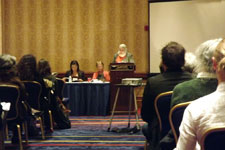
Theorizing the Palestinian Colonial: Segregation and Subjects
Co-sponsored with Mada al-Carmel
Organized by Rochelle A. Davis,* Georgetown University
Chair: Penny Johnson,* Birzeit University
Discussant: Jennifer Olmsted,* Drew University
- Lena Meari, Ph.D. candidate, Department of Anthropology, University of California, Davis and faculty member, Institute of Women’s Studies, Birzeit University – Re-structuring the Self and Politics: The Experience of Palestinian Political Activists Under Interrogation
- Nadera Shalhoub-Kevorkian, Institute of Criminology, Faculty of Law & School of Social Work and Social Welfare at Hebrew University, and Gender Studies Program Director, Mada al-Carmel – Trapped Bodies, Confined Lives and the Politics of Everydayness
- Penny Johnson,* Institute of Women’s Studies, Birzeit University – ‘Strange to Palestinian Society:’ Young People Talk About Urfi Marriage, Moral Crimes and the Colonial Present
- Hadeel Qazzaz,* Palestinian American Research Center – ‘The Ultimate Frontier:’ Cyber space defies isolation and closure
- Aitemad Muhanna, Research Fellow, School of Oriental and African Studies, London – Israeli Spatial Control, Women’s Reliance on Humanitarian Aid, and the Distortion of Gendered Subjects in Gaza
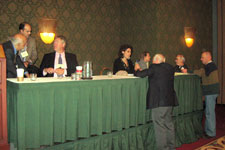
Perspectives on Islam and Politics in Palestine, Part I
Organized by Nathan J. Brown,* George Washington University
Chair: Nubar Hovsepian, Chapman University
Discussant: Glenn Robinson, Naval Postgraduate School
- Moussa Abou Ramadan, Birzeit University – Shari’a and Politics in Israel
- Ghada AlMadbouh,* University of Maryland, College Park – The Subject of Opposition: Lessons from the ‘Repressive Accommodation’ of Hamas in 2006-2007
- Helga Baumgarten, Birzeit University – Ruling Gaza: A Critical Look at the Performance in Government of the Islamic Resistance Movement Hamas, 2006/7-2010
- Mouin Rabbani,* Institute for Palestine Studies – Fatah, Hamas and the Struggle for the Palestinian Soul
Perspectives on Islam and Politics in Palestine, Part II
Organized by Nathan J. Brown,* George Washington University
Chair: Nathan J. Brown,* George Washington University
Discussant: Laurie Brand,* University of Southern California
- Holger Albrecht, American University in Cairo – Islamist Movement in an Authoritarian Proxy-State: Hamas between Governance, Opposition and Resistance
- Loren Lybarger,* Ohio University – ‘Deterritorialization’ and the Politics of Islam among Palestinian and Somalis in the United States
- Nathan J. Brown,* George Washington University – Hamas as a Muslim Brotherhood Movement
Health in the Occupied Palestinian Territory: A Growing Crisis
Organized by Penelope Mitchell,* Palestinian American Research Center
Chair: Sara M. Roy, Harvard University
Discussant: Jay Schnitzer, Boston Scientific Corporation
- Rita Giacaman, Institute of Community and Public Health, Birzeit – Health Status and Health Services in the Occupied Palestinian Territory
- Marwan Khawaja, Yale University – The Transition to Lower Fertility and Childhood Mortality in the Occupied Palestinian Territory
- Graham Watt, University of Glasgow – Medical Aid for Palestinians in the Gaza Strip
- Awad Mataria, Institute of Community and Public Health, Birzeit – The Health Care System in the Occupied Palestinian Territory: Assessment and Agenda for Reform
60 Years On: A Critical Revisiting of UNRWA for Palestine Refugees
Organized by Linda Tabar* & Mezna Qato*
Chair: Penny Johnson,* Birzeit University
Discussant: Randa R. Farah, University of Western Ontario
- Ilana Feldman,* George Washington University – UNRWA and the Challenge of Refugee Kinds
- Mezna Qato,* University of Oxford, St. Antony’s College – Pedagogical Erasures: Curriculum and the Formation of the UNRWA/UNESCO School System
- Linda Tabar,* University of Oriental and African Studies – The Reconstruction of Jenin Refugee Camp: Humanitarian Intervention and Rational Violence
- Ala Alazzeh, Rice University – Negotiating Rights: Contention and Cooperation between UNRWA and Popular Service Committees in Palestinian Refugee Camps
- Rochelle Anne Davis,* Georgetown University – UNRWA’s Education Programs and Palestinian Commemorations of the Nakba
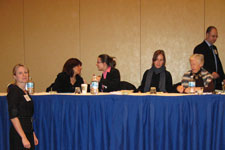
New Studies in Palestinian Society and Economy: A Panel in Honor of Rosemary and Yusif Sayigh
Organized by Rochelle Davis,* Georgetown University, Jennifer Olmsted,* and Beshara Doumani*
- PART I
Chair: Roger Owen, Harvard University
Discussant: Jennifer Olmsted,* Drew UniversityLeila Farsakh, University of Massachusetts, Boston – Revisiting the Palestinian Economy after 40 Years of Occupation – The Legacy of Yusef Sayigh’s Works
Basel Saleh, Radford University – An Analysis of the Palestinian Fiscal Situation: Challenges and Consequences
Samia al-Botmeh, Birzeit University – Labour Market Gender-differentiated Impact of Israeli Movement Restrictions in the West Bank and Gaza Strip
- PART II
Chair: Julie Peteet,* University of Kentucky, Louisville
Discussant: Beshara Doumani,* University of California, BerkeleyRanda Farah, University of Western Ontario – Refugee Camps and the Shifting Political Landscape
Isabelle Humphries,* St. Mary’s College, University of Surrey, UK – Homeless in the Homeland: Survival Narratives of Internal Refugees under Military Rule in Nazareth 1948-1966
Diana Allan,* Harvard University – From Peasants to Revolutionaries to …? Economic Subjectivity in Post-Revolution Shatila
Rosemary Sayigh, Independent Scholar – Palestinian Women Narrate Displacement: A Web-based Voice Archive
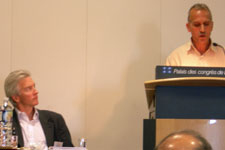
The Palestine Police and the End of the Mandate: British, Arab, and Jewish Perspectives
Organized & Chaired by Eugene Rogan,* St. Antony’s College, Oxford
- John L. Knight, University of Oxford – Securing Zion? Public Security in Mandate Palestine
- Yoav Alon, Tel Aviv University – Treading a Fine Line: The Jewish Segment of the Palestine Police
- Adel Yahya, PACE, Ramallah – Arab Policemen in Mandate Palestine: Conflict of Loyalties
- Eugene Rogan,* St. Antony’s College, Oxford – The British in the Palestine Police: Narratives of Adversity
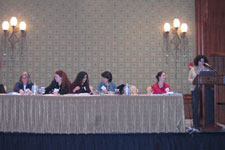
Palestinians Inside Israel Revisited
Organized by Isis Nusair* & Rhoda Kanaaneh*
Chair: Cynthia Enloe, Clark University
Discussants: Lisa Hajjar, University of California, Santa Barbara and Rebecca Torstrick, Indiana University, South Bend
- Samera Esmeir, University of California, Berkeley – Abandoned by Whom?: A Palestinian Story of Return
- Honaida Ghanim, Harvard University – Crossing the Border: Confrontation Strategies
- Lena Meari, University of California, Davis – The Roles of Palestinian Peasant Women 1930-1960: Al-Birweh Village as Model
- Isis Nusair,* Denison University – Gendered Politics of Location of Three Generations of Palestinian Women in Israel, 1948-1998
- Leena Dallasheh,* New York University – Al-‘Ard, a Pan-Arab Nationalist Movement in Israel from 1959 until 1965
- Shira Robinson,* University of Iowa – Guns, Coffee and Tractors: The Making of Non-Jewish Folklore in 1958 Israel
- Rhoda Kanaaneh,* Columbia University – A Good Arab in a Bad House? Unrecognized Villagers in the Israeli Military
- Amal Eqeiq, University of Washington – Louder than the Blue I.D.: Palestinian Hip-Hop in Israel
- Ibtisam Ibrahim, Washington College – Immigration Patterns among Arab Palestinians in Israel
The Multiple Economies of Palestine: Survival or Development?
Organized & Chaired by Sara Roy, Harvard University
- Jennifer Olmsted,* Drew University – Examining the Palestinian (and Israeli) Economies within the Framework of Sanctions
- Claude Bruderlein, HPCR, Harvard School of Public Health – Gaza 2010: A Prospective Assessment of Palestinians’ Livelihood in the Gaza Strip
- Leila Farsakh, University of Massachusetts, Boston – The Multiple Economies of Palestine: Survival or Development?
- Dennis J. Sullivan,* Northeastern University & PARC – Prospects for Egypt-Palestine Free Trade and Economic Cooperation: A Policy Analysis
- Nubar Hovsepian, Chapman University – Neoliberalism & Palestinian Economic Development Strategies (1993-2003)
New Perspectives on Mandate Palestine
Organizer/Moderator: Martin Bunton,* University of Victoria
- Ilana Feldman,* Columbia University
- Penny Johnson,* Palestinian American Research Center
- Salim Tamari, Institute of Jerusalem Studies
- Sherene Seikaly,* New York University
- Mahmoud Yazbak, University of Haifa
Palestine Today: The Possibilities and Limits of Life under Occupation
Chair and Discussant: Ibrahim Dakkak,* Chair, Advisory Committee, Palestinian American Research Center
- Penny Johnson,* Palestine Director, Palestinian American Research Center – A Father’s No Shield for His Child: Crisis and Change in Palestinian Families and Gender Dynamics in the Second Palestinian Intifada
- Lori Allen,* University of Chicago – The Banalization of Violence and the Nationalization of Emotions: Towards and Ethnography of the Palestinian Intifada
- Manal Jamal,* McGill University – ‘Popular’ and ‘Not So Popular’: Responses to Donor Assistance in Palestine
- Khalid Furani,* Graduate Center, City University of New York – Secular Prayers: An Ethnographic Encounter with Contemporary Palestinian Poetry
- Carol Malt,* Independent Scholar – Museums: Cultural Survival under Occupation
Views of the Other in Israeli and Palestinian Textbooks
Chair: Philip Mattar,* United States Institute of Peace
- Fouad M. Moughrabi, Qattan Foundation – The Politics of Palestinian
- Issam Nasser, Institute for Jersusalem Studies – Overview of Palestinian Textbooks
- Nathan Brown,* George Washington University – Debating Palestinian Democracy: The Effort to Write a New National Curriculum
- Ruth Firer, Hebrew University – A Comparative Study of Israeli and Palestinian Social Studies Textbooks
- Ilan Pappé, Haifa University – The Silencing of Critique: The Case of History Textbooks in Israel
Contemporary Social Science Research on Palestine
Chair: Ann Lesch,* Villanova University
- Judith Tucker,* Georgetown University – Writing the History of Palestine
- Glenn Robinson, Naval Post Graduate School – Current Political Science Theory and Method in the Study of Palestine
- Julie Peteet,* University of Louisville – Beyond and Within the Political: Gender and Scholarship on Palestine
- Mouin Rabbani,* Palestinian American Research Center – Social Science Research in Palestine
The Legacy and Impact of British Rule from 1922-1948
Chair: Lisa Pollard, University of North Carolina, Wilmington
Discussant: Roger Owen, Harvard University
- Ellen Fleishmann,* University of Dayton – Unnatural Vices or Unnatural Rule?: Sex Surveys During the British Mandate in Palestine
- Sandy Sufian, Center for Health Research/Oregon Health Science University – Mapping the Marsh – Malaria and the Sharing of Medical Knowledge in Mandatory Palestine
- Martin Bunton,* University of Victoria – Palestine’s Land Registers: Imperial Authority or Empirical Truth?
- Michael Fischbach,* Palestinian American Research Center – Mandatory Land Records, the U.N. and Palestinian Refugee Property Rights
- Salim Tamari, Institute for Jerusalem Studies – Post-British Records: the UNWRA Archives
